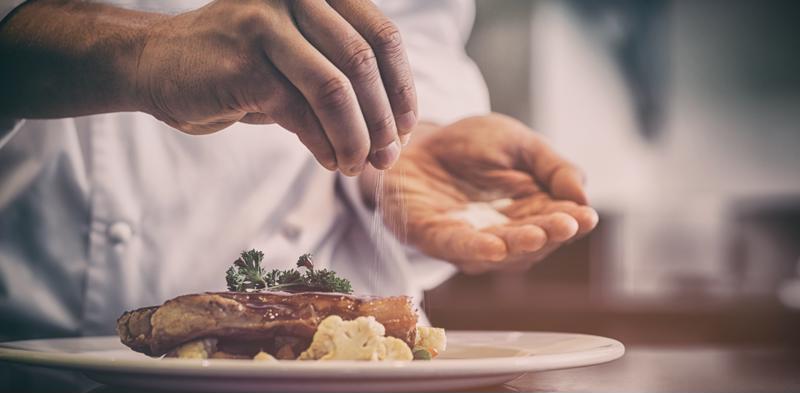A lot can go wrong in the kitchen. From a safety perspective, there's the ever-present risk of spills, slipping and falling, burns, cuts and other hazards (all the more reason to come equipped with the right gear, starting with your shoes). But not all kitchen catastrophes stem from safety failings. Some are the result of mis-measuring, mislabeling, mistiming and other mishaps that can spoil your culinary masterpiece.
As they hone their craft, students of the Auguste Escoffier Online Culinary Arts Program are sure to sooner or later run into a culinary crisis that threatens the integrity of their hard work. Here are a few disaster-preparedness tips to keep you on your toes in the kitchen.
Stay organized to avoid disasters in the first place
Keeping a well-organized kitchen and clearly labeling everything in it is one of the most effective ways to avoid accidentally spiking your apple pie with cayenne pepper, swapping out the tablespoon for a teaspoon or making other careless errors. Ellen Bennett, a kitchen-ware entrepreneur, told The New York Times that she suggests organizing cookware into categories of "prep, cook, serve, store," and preferably keeping them in plain sight. She also advises a similar approach for spices and ingredients, which should be stored by function and/or flavor. Equally important, everything should be labeled and dated. This will help you avoid using the wrong ingredients, or, just as bad, using expired ingredients.
Salvaging a salt overload
Even the most organized chefs make mistakes, and adding too much salt is one of the most common. Maybe you accidentally used the tablespoon measure instead of the teaspoon when doling out the salt. Maybe the cap fell off. Or maybe you just didn't get the proportions right. Whatever the case, there may be a few simple ways to salvage your dish. For a sauce or stew, Rachel Ray recommends diluting with unsalted water. She also advises sour cream, which can change the perception of taste, or vinegar or lemon juice to help distract your taste buds from the saltiness. Just make sure that you add any ingredient incrementally, taste-testing as you go. The best option – if you how much excess salt you added and have enough ingredients on hand – is to increase the proportion of other ingredients. As for using potatoes to absorb the salt, that's a myth according to The Kitchn. You can certainly add potatoes to help change the proportion of ingredients, but spuds have no special salt-absorbing properties to speak of.
 Over-seasoning is one of the easiest mistakes to make.
Over-seasoning is one of the easiest mistakes to make.Other common situations
Let's look at a few more quick fixes for other potential disasters:
Burnt soups or sauces
Take the pot off the heat the moment you suspect burning and immediately submerge into cool water to stop further cooking. Carefully move the contents into a new pot, leaving the burnt parts at the bottom of the pot. Livestrong also recommended adding bread or potatoes to try to absorb some of the burnt flavor as well as strategic seasoning to mask the taste. Really though, prevention and fast action are the only sure methods to salvage a burnt stew, soup or sauce.
Too much spice
This one's a little easier. Dairy, acids (for instance, from a lime) and sweeteners can all help mask too much spicy, according to The Kitchn.
Conserve what you can
When you can't undo a kitchen blunder, you can try to avoid waste by using whatever ingredients you can. For example, overdone meat can be ground or shredded and used in a sauce. Slightly burnt cookies or cake can be used as toppings for certain desserts, or crumbled up and incorporated into pies, cobblers and cakes. Similarly, burnt bread can be ground up and used as bread crumbs for casseroles, breaded filets and other dishes.
Kitchen disasters come with the territory, but online culinary students will learn to make the most of them, and come out a more resourceful and seasoned chef.

